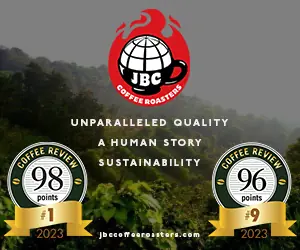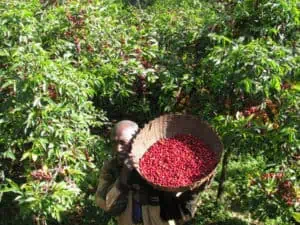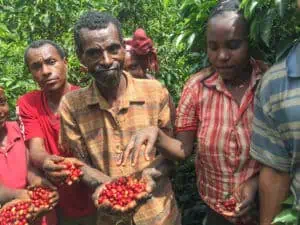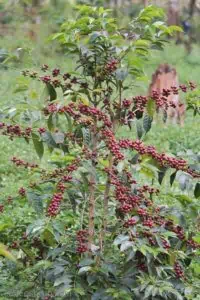Certified organic coffees must be propagated, grown, processed, transported, stored, and roasted without contact with synthetic chemicals—particularly without contact with pesticides and herbicides. The certification process (carried out by a variety of organizations operating inside a common framework) is lengthy, thorough, rather expensive, but apparently reliable and free of abuse. The use of the term organic is built into the law in many countries, including the U.S.
The organic movement is fueled in large part by consumers’ health concerns. People are understandably wary of consuming agricultural poisons along with their fruits and vegetables. With coffee, however, the health issue is less persuasive than it is with many other agricultural products: apples or strawberries, for example, which we consume whole and often raw. We do not consume the fruit of the coffee tree. Instead, we strip the fruit off and compost it, retaining only the seed, which we then dry, roast at very high temperatures, grind, and soak in hot water. Subsequently we throw away the dried, roasted, ground seeds and drink the water.
No study we have seen links prepared or brewed coffee, including espresso, with significant levels of contaminants. Typical is a 2008 Australian study which meticulously tested a wide range of coffee beverages purchased randomly in the Australian food service market and found that “there were no detectable levels in any of the coffee [beverages] sampled. This included all 98 pesticide residues, 18 PAHs, beryllium, mercury and ochratoxin A.” The key findings summary concluded that “The overall levels of chemical contaminants identified in this survey are generally considered to be low and are consistent with those reported in other comparable surveys both in Australia and overseas.”
Nevertheless, pesticides and herbicides are widely used, sometimes abused, in the coffee fields of the world. Many consumers seek organically grown coffees out of concern for the health of the earth itself and those who live on it. According to a report from Technavio Research, the Compound Annual Growth Rated (CAGR) for organic coffee is expected to increase by 13% between now and 2021. This research attributes this projected growth, in part, to millennials, who, as a demographic, are said to be concerned with the environment and a healthy lifestyle, and to have a willingness to spend money for specialty or niche products like organic coffee. So it appears that, while the driving force behind the demand for organic coffee may be changing from health concerns to environmental concerns, the demand itself is on the rise. According to a World of Organic Agriculture 2016 report quoted by ecologist Julie Craves, coffee is the world’s largest single organic crop.
11 Top-Scorers from Ethiopia
Although the largest volume of organically grown coffee is produced in Latin America, particularly in Peru and Mexico, Africa also produces significant volumes. We have tested and enjoyed many engaging and distinctive organically grown coffees from Africa over the past couple of years, hence the subject of this report. Our hope was that we would source a range of organically certified coffees from several producing countries on the African continent.
It did not turn out that way. Out of 70 samples submitted, 56 were from one country—Ethiopia. Furthermore, of the 11 coffees rated 92 or higher and reviewed here, all were produced in Ethiopia.
In retrospect, the dominating presence of Ethiopia should have come as no surprise. Ethiopia usually vies with Mexico as the world’s second-largest producer of certified organic coffees, after Peru. And, certifications aside, almost all of Ethiopia’s coffee is farmed without synthetic inputs of any kind, largely because farmers can’t afford them. A study done in 2014 by the International Coffee Organization estimated that 95% of Ethiopia’s coffee is de facto organically grown. Nevertheless, only 10% of that coffee is eligible for organic certification because the rest is not fully traceable back to the cooperative or farm where it was produced.
Many roasters queried us to ask if they could submit coffees they felt confident were farmed without use of synthetic inputs because of their familiarity with the producers. Nevertheless, for this report, we concluded that we needed to stick to reviewing coffees that consumers could be assured were produced under organic conditions using organic protocols. We went so far as to check the organic documentation at the farm level provided by importers for all the coffees we review here.
Finally, the timing of this report perhaps favored coffees produced north of the equator, where the main coffee harvest takes place earlier in the year, rather than south of the equator, in countries like Tanzania and Uganda, where the harvest starts near the end of the year. When choosing the optimum time to organize a tasting report, we often struggle at Coffee Review with these sorts of timing trade-offs.
One Country, Plenty of Options
Although only one producing country is represented in this month’s reviews, the range of coffees styles and pleasures these reviews describe is wide and engaging. Consumers seeking an exceptional cup carrying the reassurance of a third-party-verified certification will find a wide range of sensory options here, all distinctive and all deeply attractive.
Ethiopia coffees, whether certified organic or not, are produced from tree varieties native to Ethiopia and grown virtually nowhere else. These varieties tend to produce coffees with typically striking cup character: bright, lively and balanced in structure and intricately engaging in aroma and flavor. Furthermore, the best mills in Ethiopia are also ingenious and meticulous in their processing methods. Classic wet-processed or “washed” Ethiopia coffees (in which fruit skin and pulp are removed before drying) tend to highlight floral and citrus notes, while “natural”-processed Ethiopias (beans are dried inside the fruit rather than after the fruit has been removed) lean toward lusher fruit and deeper flowers. Fine examples of organic coffees prepared by both processing methods appear in this month’s reviews.
Of the 14 samples we received of organic-certified coffees produced in Africa origins outside Ethiopia, nine were from the Democratic Republic of Congo and two were from Uganda. Kenya, Burundi and Rwanda contributed one sample each. These 14 coffees ranged in scored from 84-91, with five scoring 90 or above, a good showing, and encouragement for those who may want to consider buying organic coffees from these origins. The vast Democratic Republic of the Congo (DRC), which contributed nine samples, has established itself as a source of fine specialty coffee through the development of the SOPACDI cooperative in the far eastern part of the DRC, just across Lake Kivu from Rwanda. This rapidly growing cooperative now has 5,600 members and is apparently succeeding its goal to help heal wounds left by the latest in eastern Congo’s seemingly endless string of horrific civil wars. The cooperative’s coffees typically carry both organic and Fair Trade certification and can be quite attractive in the style of the pungently spicy, sweet-savory coffees that often come out of the African Great Lakes region.
How Does Organic Certification Look to Roasters?
One of the more interesting themes to surface during our testing and interviewing for this report was the relationship of roasters to the certified organic market. These relationships turned out to be more complex than we expected.
Organic certification at the farm level is overseen by various regional agencies, but, unlike sellers of organic vegetables, who don’t need further certification to sell organic produce, coffee roasters must also be certified in order to legally sell coffee that is labeled “organic.” Roasters must supply the certifying agency (different in each state) with certification paperwork from the farm and importer, as well as undergo annual inspection to ensure that organic coffees are handled in areas separate from non-organic, in much the way Kosher food is certified. This process involves both a one-time application fee and an annual inspection fee, fees that many small-scale roasters complain they cannot afford.
The obvious question arises, then: How important is organic certification to the roaster? We received almost as many answers as the number of roasters we interviewed.
The Bag and the Coffee Inside
Approaches ranged from commitment to organic as a core value in a business model to mere coincidence or afterthought. Furthermore, several of the top-scoring coffees came from roasters who don’t label their coffees as organic, even when these coffees are farmed organically. The reason? They don’t have USDA certification as organic roasters, making it illegal for them to do so.

Reunion Island lists the organic certifier at the farm level on their retail bags. Courtesy of Reunion Island.
The top-rated Reunion Island Sidama (94) is Fair Trade as well as organic-certified. Anne Wiseman, marketing coordinator for Reunion Island, says that it’s important for the company to offer organic-certified coffees, and that their organic selection is growing with consumer demand. Reunion Island has committed to carry this same organically-certified Sidama, from the same importer and producers, on an ongoing basis.
Randy Lint, of Big Creek Coffee Roasters in Hamilton, Montana sent us an Ethiopia Gedeb Halo Beriti (94) that is certified organic at origin, but is not labeled organic. While Lint has been a certified organic handler in the past, he has found the cumbersome process of certifying his roastery not worth the cost, though he is still committed to the associated practices. He says his local customers trust his sourcing, and his business is successful without offering the added reassurance of certification. Nevertheless, Lint acknowledges that this might change as his roastery grows.
Revel Coffee’s Gary Thiesen has a similar perspective. For him, cup quality is more important than certification, though he was pleased to be able to purchase the Ethiopia Shakiso Mormora (reviewed here at 92) as certified organic at the farm level. But nothing on the bag indicates this certification, as per U.S. law.
However, Haden Polseno-Hensley, co-owner of Red Rooster Coffee Roaster, whose Ethiopia Kayon Mountain scored 93, pursues a business model committed to organic certification. He observed that organic-certified coffees are often of higher quality than those not certified. He says, “When we started in 2010, we were 100% organic. This was based on philosophical choice, but also marketing strategy. Large grocery store chains, especially ‘lifestyle’ chains, want organics. They want to press the ‘easy’ button when it comes to showing their customers that they have quality goods. Ethiopia is a strange bird, though. While it may be true that most Ethiopian coffees are de facto organic, we’ve actually come to find that the certified coffees are often of a higher quality. Is this because the producers are more attentive to cultivation and processing since they are paying for certificates?”
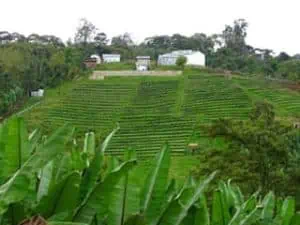
The terraced slopes of Kayon Mountain in the Guji Zone of southern Ethiopia. Courtesy of Cafe Imports.
Willoughby’s Coffee & Tea is represented here with an Ethiopia Gelgelu Natural (93). Owner Barry Levine regards organic certification as important because many consumers prefer it. But, as a company, he says Willoughby’s is “quality-centric.” He goes on to say that, “We would have purchased this coffee had it been conventional, but have a preference, when the quality is really there, to have an organic offering, too. We have, in fact, had other excellent Ethiopia Naturals this season that were not organic, but were just too good to pass up. This coffee offered it all.” Because of logistical considerations, some Willoughby bags include the USDA organic seal and others do not. For this particular coffee, Willoughby’s prints the organic certifier on their bags in lieu of the USDA stamp.
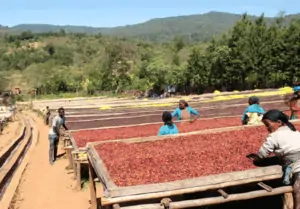
Coffee cherries drying on raised beds at the Worka Cooperative in southern Ethiopia. Courtesy of Willoughby’s Coffee & Tea.
The same holds true for Kickapoo Coffee, whose Ethiopia Kirite also scored 93. Caleb Nicholas says, “About 97 percent of the coffee we roast is certified organic, and we would not have purchased the Kirite if it were conventional. The USDA seal is optional, and we designed the bags to accommodate both organic and non-organic. If we put the seal on it, it would be just another sticker. Instead, we just label the coffee as organic and list our certifier, MOSA.”
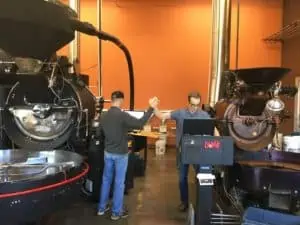
Kickapoo Coffee’s roasters working side by side on vintage Probat machines. Courtesy of Kickapoo Coffee.
The Ethiopia Amaro Gayo Natural roasted by Ben’s Beans (92) happens to be certified organic, but co-owner Glen Lundstrom is willing to purchase quality coffees that are farmed organically but do not have certification if his trusted importers recommend a particular coffee. He says, “We are looking for coffees that are grown and processed free of any sort of chemical intervention. We specialize in certified organic coffees because this provides our customers with a level of confidence that the coffees are grown and processed using healthy and sustainable practices. However, we also realize that, because many of these coffees come from smaller farms, organic certification is not always an economically viable option, even though [the farmers] may grow and produce the coffees using the same practices as a certified farm. That is why we rely heavily on our import partners to provide us with background information on the farms and processors of any coffee we purchase.”
“Organic certification,” says Aaron Jordan of Roast House Coffee, whose Ethiopia Suke Quto scored 92, “is the bedrock of Roast House’s green coffee purchasing values. Seven years ago when the company started, we made a commitment to exclusively purchasing organically grown coffees, and one of the ways we prove that commitment is through certifications. It’s very important to the core of our business values and ethics.” So, Roast House has essentially built its business on organic certification as a fundamental value, and has drawn customers who share that priority, rather than picking and choosing coffees to market to various customer sectors. However, the Suke Quto bag doesn’t include the USDA organic seal, simply because Jordan reserves bags with the seal for his year-round offerings. (The Suke Quto is a limited reserve).
Also reviewed here are Black Oak’s Ethiopia Hambela Alaka (93) and Noble Coffee’s Ethiopia Bishan Fugu (93), both of which are certified USDA organic, and labeled as such on the bags. Red E Café’s Homacho Waeno Natural (93; one of two coffees on this list imported by Sustainable Harvest), is in the same category as the Big Creek and Revel coffees noted above: certified organic at the farm level, but with no certification indicated on the bags.





